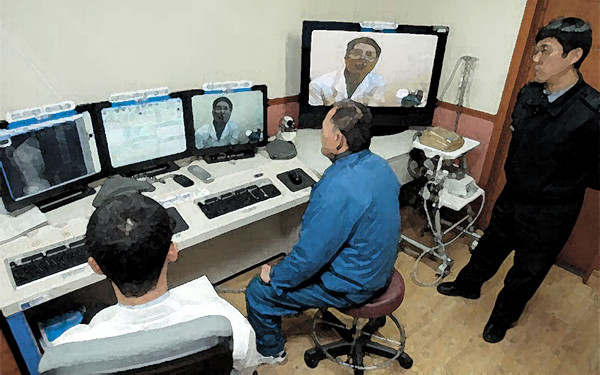The National Human Rights Commission of Korea (NHRCK) recommended expanding telemedicine in correctional facilities.
Prisons need to hire more physicians to guarantee inmates’ access to healthcare, but if it is not feasible, they should instead broaden contactless medical services, the human rights watchdog said.

NHRCK said it notified such a recommendation to the Minister of Justice on Tuesday after inspecting 10 correctional facilities across the nation, including those in Busan, Suwon, Ulsan, and Chuncheon, in November.
NHRCK found that 53 correctional facilities nationwide had a quota of 117 physicians, but only 89 were working there as of September 2021. The number of temporarily dispatched public health doctors recorded 94 – higher than the total number of regularly working physicians. Among the 53 facilities, 26 had one doctor, and five had a public health doctor only.
Specialists were particularly in shortage. Thirty-eight facilities (71.1 percent) out of 52, except for one private facility, had no specialist working as a regular employee.
The remaining facilities had 21 specialists – six in family medicine, four in obstetrics and gynecology, two in urology, two in surgery, two in psychiatry, two in thoracic surgery, two in anesthesia and pain medicine, and one in anatomy.
Correctional facilities suffer a chronic shortage of physicians. Since 2011, they have never filled the target quota. The proportion of physicians out of the target quota declined from 91 percent in 2013 to 76 percent in 2021.
On average, 89 physicians at 53 facilities have to see 4,804 patients per day.
NHRCK attributed the shortage of doctors in correctional facilities to low wages and inefficient work systems.
It said that corrective facilities should provide more telemedicine for inmates to solve this problem.
“The Ministry of Justice should pay more attention to hiring specialists and pharmacists and establish a long-term strategy such as offering various incentives to attract healthcare workers,” NHRCK said.
Correctional facilities provided 24,088 telemedicine services in 2020 and 28,501 in 2021. They offered about 79 daily telehealth services, which accounts for only 1.6 percent of the average daily 4,804 consultations.
NHRCK said telehealth could be one of the solutions to relieve the shortage of doctors in correctional facilities. The Justice Ministry installed telemedicine devices in most correctional facilities in 2021. Still, the facility workers rarely used the device because of their negative perception of external hospitals and limited medical consultation areas.
“Considering that correctional facilities find it difficult to recruit doctors, they need to expand telemedicine by working with institutions that provide remote care to treat chronic diseases such as hypertension and diabetes,” NHRCK said.
It also recommended raising the healthcare budget for correctional facilities, enhancing medical care for mentally ill inmates, expanding the prison sentence (detention) suspension system, guaranteeing the appropriate temperatures in prisoners’ rooms by the law, and improving the hot water supply in cold weather.

